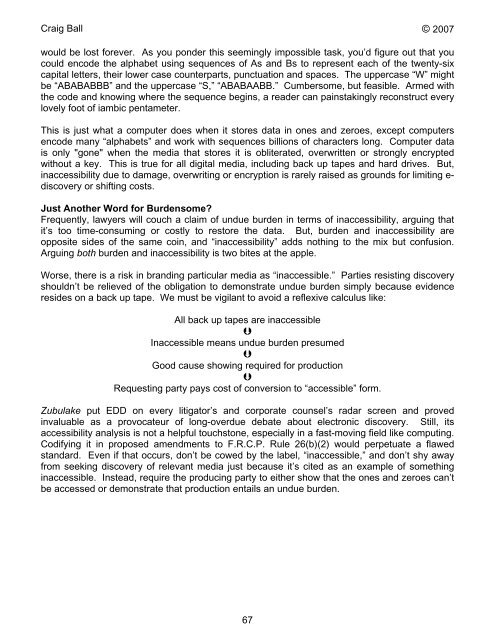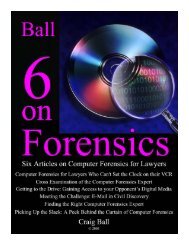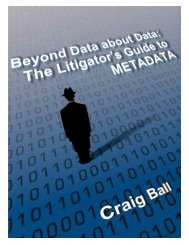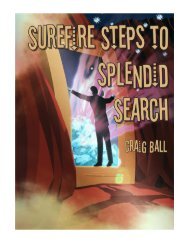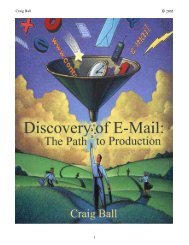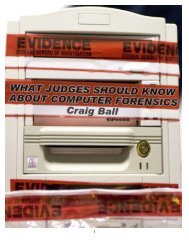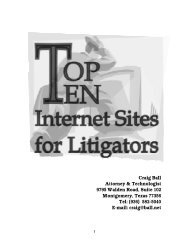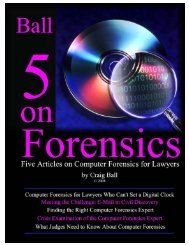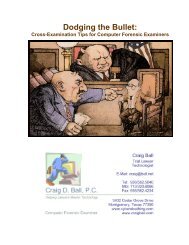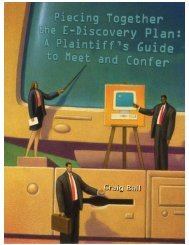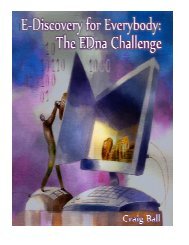Six Articles on Electronic - Craig Ball
Six Articles on Electronic - Craig Ball
Six Articles on Electronic - Craig Ball
You also want an ePaper? Increase the reach of your titles
YUMPU automatically turns print PDFs into web optimized ePapers that Google loves.
<strong>Craig</strong> <strong>Ball</strong> © 2007<br />
would be lost forever. As you p<strong>on</strong>der this seemingly impossible task, you’d figure out that you<br />
could encode the alphabet using sequences of As and Bs to represent each of the twenty-six<br />
capital letters, their lower case counterparts, punctuati<strong>on</strong> and spaces. The uppercase “W” might<br />
be “ABABABBB” and the uppercase “S,” “ABABAABB.” Cumbersome, but feasible. Armed with<br />
the code and knowing where the sequence begins, a reader can painstakingly rec<strong>on</strong>struct every<br />
lovely foot of iambic pentameter.<br />
This is just what a computer does when it stores data in <strong>on</strong>es and zeroes, except computers<br />
encode many “alphabets” and work with sequences billi<strong>on</strong>s of characters l<strong>on</strong>g. Computer data<br />
is <strong>on</strong>ly "g<strong>on</strong>e" when the media that stores it is obliterated, overwritten or str<strong>on</strong>gly encrypted<br />
without a key. This is true for all digital media, including back up tapes and hard drives. But,<br />
inaccessibility due to damage, overwriting or encrypti<strong>on</strong> is rarely raised as grounds for limiting e-<br />
discovery or shifting costs.<br />
Just Another Word for Burdensome?<br />
Frequently, lawyers will couch a claim of undue burden in terms of inaccessibility, arguing that<br />
it’s too time-c<strong>on</strong>suming or costly to restore the data. But, burden and inaccessibility are<br />
opposite sides of the same coin, and “inaccessibility” adds nothing to the mix but c<strong>on</strong>fusi<strong>on</strong>.<br />
Arguing both burden and inaccessibility is two bites at the apple.<br />
Worse, there is a risk in branding particular media as “inaccessible.” Parties resisting discovery<br />
shouldn’t be relieved of the obligati<strong>on</strong> to dem<strong>on</strong>strate undue burden simply because evidence<br />
resides <strong>on</strong> a back up tape. We must be vigilant to avoid a reflexive calculus like:<br />
All back up tapes are inaccessible<br />
<br />
Inaccessible means undue burden presumed<br />
<br />
Good cause showing required for producti<strong>on</strong><br />
<br />
Requesting party pays cost of c<strong>on</strong>versi<strong>on</strong> to “accessible” form.<br />
Zubulake put EDD <strong>on</strong> every litigator’s and corporate counsel’s radar screen and proved<br />
invaluable as a provocateur of l<strong>on</strong>g-overdue debate about electr<strong>on</strong>ic discovery. Still, its<br />
accessibility analysis is not a helpful touchst<strong>on</strong>e, especially in a fast-moving field like computing.<br />
Codifying it in proposed amendments to F.R.C.P. Rule 26(b)(2) would perpetuate a flawed<br />
standard. Even if that occurs, d<strong>on</strong>’t be cowed by the label, “inaccessible,” and d<strong>on</strong>’t shy away<br />
from seeking discovery of relevant media just because it’s cited as an example of something<br />
inaccessible. Instead, require the producing party to either show that the <strong>on</strong>es and zeroes can’t<br />
be accessed or dem<strong>on</strong>strate that producti<strong>on</strong> entails an undue burden.<br />
67


